Related Research Articles

The meaning of life, or the answer to the question: "What is the meaning of life?", pertains to the significance of living or existence in general. Many other related questions include: "Why are we here?", "What is life all about?", or "What is the purpose of existence?" There have been many proposed answers to these questions from many different cultural and ideological backgrounds. The search for life's meaning has produced much philosophical, scientific, theological, and metaphysical speculation throughout history. Different people and cultures believe different things for the answer to this question.

The categorical imperative is the central philosophical concept in the deontological moral philosophy of Immanuel Kant. Introduced in Kant's 1785 Groundwork of the Metaphysics of Morals, it is a way of evaluating motivations for action. It is best known in its original formulation: "Act only according to that maxim whereby you can at the same time will that it should become a universal law."

Either/Or is the first published work of the Danish philosopher Søren Kierkegaard. Appearing in two volumes in 1843 under the pseudonymous editorship of Victor Eremita, it outlines a theory of human existence, marked by the distinction between an essentially hedonistic, aesthetic mode of life and the ethical life, which is predicated upon commitment.
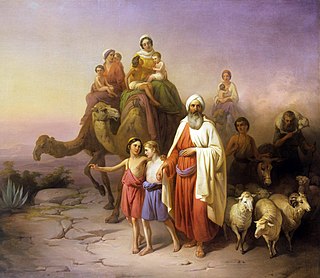
Fear and Trembling is a philosophical work by Søren Kierkegaard, published in 1843 under the pseudonym Johannes de silentio. The title is a reference to a line from Philippians 2:12, "...continue to work out your salvation with fear and trembling." — itself a probable reference to Psalms 55:5, "Fear and trembling came upon me..."
The fallacy of composition is an informal fallacy that arises when one infers that something is true of the whole from the fact that it is true of some part of the whole. A trivial example might be: "This tire is made of rubber, therefore the vehicle of which it is a part is also made of rubber." This is fallacious, because vehicles are made with a variety of parts, most of which are not made of rubber. The fallacy of composition can apply even when a fact is true of every proper part of a greater entity, though. A more complicated example might be: "No atoms are alive. Therefore, nothing made of atoms is alive." This is a statement most people would consider incorrect, due to emergence, where the whole possesses properties not present in any of the parts.

Green Wing is a British sitcom set in the fictional East Hampton Hospital. It was created by the same team behind the sketch show Smack the Pony – Channel 4 commissioner Caroline Leddy and producer Victoria Pile – and stars Mark Heap, Tamsin Greig, Stephen Mangan and Julian Rhind-Tutt. It focuses on soap opera-style twists and turns in the personal lives of the characters, portrayed in sketch-like scenes and sequences in which the film is slowed down or sped up, often emphasising the body language of the characters. The show had eight writers. Two series were made by the Talkback Thames production company for Channel 4.
Existential psychotherapy is a form of psychotherapy based on the model of human nature and experience developed by the existential tradition of European philosophy. It focuses on concepts that are universally applicable to human existence including death, freedom, responsibility, and the meaning of life. Instead of regarding human experiences such as anxiety, alienation and depression as implying the presence of mental illness, existential psychotherapy sees these experiences as natural stages in a normal process of human development and maturation. In facilitating this process of development and maturation existential psychotherapy involves a philosophical exploration of an individual's experiences while stressing the individual's freedom and responsibility to facilitate a higher degree of meaning and well-being in his or her life.

The Concept of Anxiety: A Simple Psychologically Orienting Deliberation on the Dogmatic Issue of Hereditary Sin is a philosophical work written by Danish philosopher Søren Kierkegaard in 1844. The original 1944 English translation by Walter Lowrie, had the title The Concept of Dread. The Concept of Anxiety was dedicated "to the late professor Poul Martin Møller". Kierkegaard used the pseudonym Vigilius Haufniensis for The Concept of Anxiety.

"The bush" is a term mostly used in the English vernacular of Australia and New Zealand where it is largely synonymous with hinterland or backwoods respectively, referring to a natural undeveloped area. The fauna and flora contained within this area may be mostly indigenous to the region, although exotic species will often also be present.
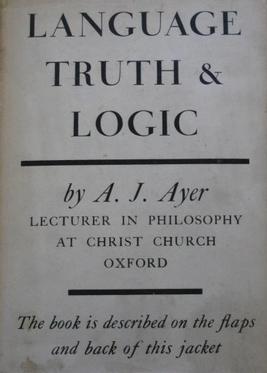
Language, Truth and Logic is a 1936 book about meaning by the philosopher Alfred Jules Ayer, in which the author defines, explains, and argues for the verification principle of logical positivism, sometimes referred to as the criterion of significance or criterion of meaning. Ayer explains how the principle of verifiability may be applied to the problems of philosophy. Language, Truth and Logic brought some of the ideas of the Vienna Circle and the logical empiricists to the attention of the English-speaking world.
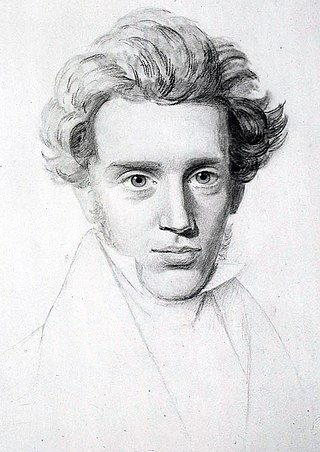
The philosophy of Søren Kierkegaard has been a major influence in the development of 20th-century philosophy, especially existentialism and postmodernism. Søren Kierkegaard was a 19th-century Danish philosopher who has been labeled by many as the "Father of Existentialism", although there are some in the field who express doubt in labeling him an existentialist to begin with. His philosophy also influenced the development of existential psychology.

Edifying Discourses in Diverse Spirits or Upbuilding Discourses in Various Spirits are English translations for the title of a work published on March 13, 1847, by Søren Kierkegaard. The book is divided into three parts just as Either/Or was in 1843 and many of his other discourses were. Kierkegaard had been working toward creating a place for the concepts of guilt and sin in the conscience of the single individual. He discussed the ideas generated by both Johann von Goethe and Friedrich Hegel concerning reason and nature. This book is his response to the ideas that nature and reason are perfect.
Losing Gemma is a two-part British television thriller, based on the debut novel by Writer Katy Gardner. The screen adaptation was written by Robert Murphy, directed by Maurice Phillips and starred Jonas Armstrong, Alice Eve, Jason Flemyng and Rachel Leskovac. It originally aired on ITV on 18 and 19 December 2006, at 9pm. The plot centres on the disappearance of the eponymous Gemma (Leskovac) after she goes backpacking with friend Esther (Eve) in India. When Esther returns from the trip alone, she is haunted by the belief that Gemma's disappearance is her fault, but mystery surrounds what really happened. Notably, the drama has never been released on DVD.
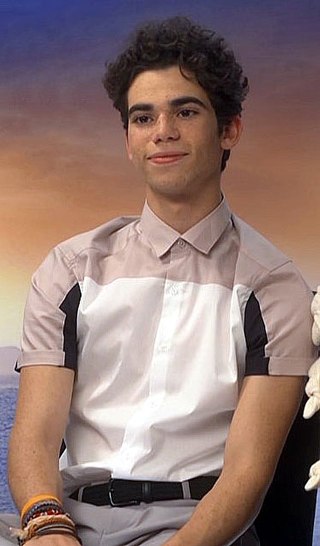
Cameron Mica Boyce was an American actor. He began his career as a child actor, appearing in the 2008 films Mirrors and Eagle Eye, along with the comedy film Grown Ups (2010) and its 2013 sequel. His first starring role was on the Disney Channel comedy series Jessie (2011–2015).
Double-mindedness is a concept used in the philosophy and theology of the Danish philosopher Søren Kierkegaard (1813–1855) as insincerity, egoism, or fear of punishment. The term was used in the Bible in the Epistle of James. Kierkegaard developed his own systematic way to try to detect double-mindedness in himself.
Three Upbuilding Discourses (1843) is a book by Danish philosopher Søren Kierkegaard. Kierkegaard continues his discussion of the difference between externalities and inwardness in the Discourses, but moves from the inwardness of faith to that of love. Everything is always changing in the external world but in the inner spiritual world there is one thing that never changes according to Kierkegaard. He says, “What is it that never changes even though everything is changed? It is love, and that alone is love, that which never becomes something else.” Love is dependent on how a person sees and when the individual sees with love that individual can see away sin in himself as well as the sin of the whole world, just as Christ did.
Two Upbuilding Discourses (1844) is a book by Søren Kierkegaard.

There are many varieties of positive and negative effects of criticism. This article describes common types that occur regularly in everyday life. For other criteria that classify criticisms, see Criticism § Classifications. For more subject-specific information, see the pages on topics such as art, film, literature, theatre, or architecture.
Sex, Death and the Meaning of Life is a three-part television documentary presented by Richard Dawkins which explores what reason and science might offer in major events of human lives. He argues that ideas about the soul and the afterlife, of sin and God's purpose have shaped human thinking for thousands of years. He believes science can provide answers to some of these old questions we used to entrust to religion.
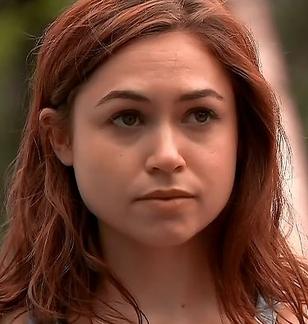
Tamara Jane Kingsley is a fictional character from the Australian Channel Seven soap opera Home and Away, played by Kelly Paterniti. Tamara debuted on-screen during the episode airing on 1 October 2012. Originally a guest cast member, Paterniti was promoted to the show's regular cast. Tamara is a country girl, characterised as a "strong-willed and feisty female". Paterniti has described her as "very bold and quite pragmatic". Paterniti filmed her final scenes as Tamara in late 2013 and made her screen exit on 21 May 2014.
References
- ABC At The Movies Reviewed 21 March 2012
- Thirst on iTunes
- Robert Carter: Metaphor Man and a Plague of moths Screenhub